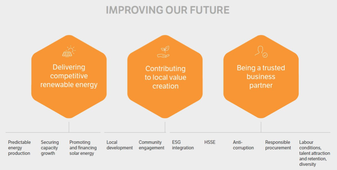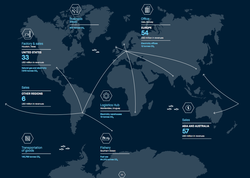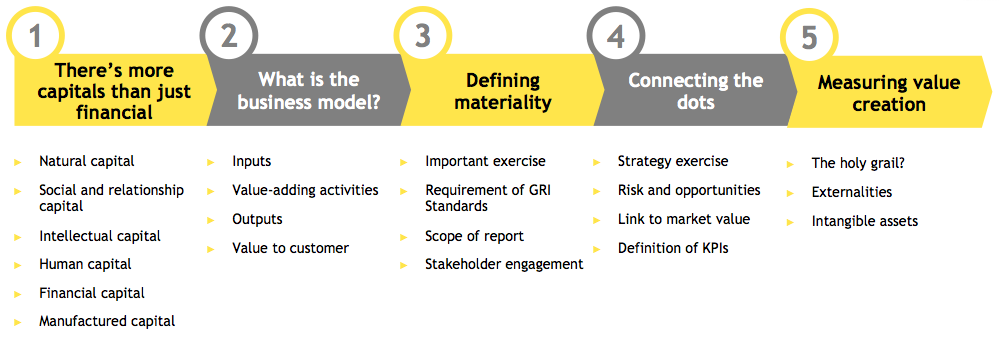Sustainability Hub co-hosted with Scatec Solar, Storebrand, Statkraft and Aker Biomarine a fully-booked breakfast seminar about sustainability reporting. The event presented national and international trends within sustainability reporting and discussed different reporting perspectives and possibilities.Scroll down to the bottom of the article to access the Event Tool Kit with the pdf-downloads of the presentations, key notes and literature recommendations for further education. Part 1: Overview of the reporting landscape Sunniva Bratt Slette, Event Coordinator at NTNU Sustainability Synne Mari Pedersen, Consultant at EY Bratt Slette and Pedersen offered an introduction on sustainability reporting drawn from their award winning Master’s Thesis at NTNU, “Financing the Transition to a Green Economy”. The thesis also resulted in a summarised business report, “Establishing a Green Investment Bank”. Bratt Slette and Pedersen recognised that one of the main challenges to sustainable reporting is the amount of available reporting tools and initiatives available, which they calculated to be over 400. They argued for the case of standardisation of sustainability reporting and in particular for integrated reporting. Their studies showed that companies are increasingly moving towards integrated reporting or, if not, want to get on that pathway. They presented a five-step plan towards integrated reporting. Among the steps, Pedersen emphasised the importance of the first one, "to acknowledge that there are more capitals than just financial ones". Bratt Slette pointed out that “integrated reporting is of course not the only solution. You can have a sustainability report and there are many ways to disclose information. The main idea is that you make data available and contribute to transparency in the market.” Part 2: Reporting from the investors perspective Matthew Smith, Head of Sustainable Investments at Storebrand Asset Management Smith started his talk on sustainability reporting with the contradictory statement "I don't read sustainability reports". Reading sustainability reports was a big part of his work in the past, however, today investors turn to third party ratings providers who create ratings and ESG assessments for them. Smith presented the investor perspective and summarised three key aspects for good sustainability reporting that companies need to keep in mind to please the investors. Materiality and performance metrics is the first requisite. "It's important not to focus just on descriptive qualitative reporting but also on hard facts and numbers", Smith said. “We can't use stories, give us more quantifiable and financially relevant measurements." "In terms of materiality, less is more. We are looking to see companies isolate the factors that have the most effect on their central business operations or on their stakeholders." To support materiality, Smith emphasised the importance that the reports are "audited according to international standards and receive a reasonable assurance level from auditors." Smith moved on to consistency and quality control as the second requisite. "We are looking for companies to use internationally recognised reporting frameworks like the GRI or the IIRC, and to use these to build up the quality of the report." The third requisite investors are looking for is the scope of the report. To evaluate risks, there is a need to know where companies operate and how much of the operations are in different locations. There is therefore a need for country by country reporting. Like Pedersen and Bratt Slette, Smith also discussed the Recommendations of the Task Force on Climate-related Financial disclosure. "It was interesting to see where the focus was. It wasn’t primarily on carbon metrics, or what's happening there in the company, but the focus was on business strategies, financial planning, stress testing for future scenarios and what is going to happen in the company in 10 years, whether the company is prepared for upcoming scenarios. That is an interesting focus and one that we support." Smith finished by reflecting on Storebrand's own efforts within sustainability reporting and the extent of it. Smith opened up about the amount of expectations on companies in terms of sustainability reporting and referred to it as the elephant in the room. "Reporting is positive in its essence, we like transparency, we like getting information about companies. However, my question is at what point does reporting go from being a positive transparent exercise to becoming a negative burden that takes away the resources from other important areas?". Smith continued, "a lot of the reporting initiatives are officially voluntary but the pressure on companies like Storebrand, with ambition within sustainability to report on every new initiative that comes up, is quite considerable." Smith also touched on the subject of the SDGs and said "if the SDGs are going to be used, I think it is important that they are not used only as community involvement but also as a way of exemplifying and illustrating that our core business is in fact in line with the SDGs". Part 3: Tell the stories Kari Mercedes Fremme, Vice President Sustainability at Scatec Solar  Source: from event presentation, available for download in the Event Tool Kit Source: from event presentation, available for download in the Event Tool Kit In addition to co-hosting the event, Scatec Solar also launched their sustainability report this morning. Mercedes Fremme started by acknowledging "sustainability in Scatec Solar is not something you put in a department. We are one and a half sustainability employees, soon to be two and a half, but the majority of people working with sustainability are on the ground." Mercedes Fremme presented to the audience two stories from their solar plants and emphasised the importance of sharing the stories around your sustainability work. "We can not have a sustainability report without the stories. of course we need to have facts, so we have a lot of statistics, a lot of indicators, how much carbon we abate and so on, but the core of the report and the reason this is moving us, is the stories themselves. The stories happen, hopefully not only by us, but through us, through our partners." Scatec Solar performed a materiality analysis from which they extracted three important axis to report on. Mercedes explained the importance behind the third one, being a trusted business partner. "Despite being in areas where corruption or bad things happen, we intend to be, and we believe we are, an island of integrity in these areas. Most of all, we are an island of learning, because I think the most benefited ones from being in these communities are ourselves. We have discovered through our journey that sustainability is a two-way road. We often talk about how the community benefits, but the biggest beneficiary of them all is us, both as a company, and as individuals and employees". Part 4: Engage internally Cilia Holmes Indahl, Sustainability Director at Aker BioMarine  Source: from event presentation, available for download in the Event Tool Kit Source: from event presentation, available for download in the Event Tool Kit Aker BioMarine just launched their annual report with their integrated sustainability report. Holmes Indahl explained that they took their report up a notch this year and presented to us the key updates. Holmes Indahl talked about the importance of keeping different audiences in mind when creating your report - for the investors of course, but also for your employees as well. By involving your employees in the creation of your sustainability strategy you create engagement and an important sense of ownership for the employees. In line with that thought, Holmes Indahl created an internal Facebook poll about the SDGs. "We asked the employees to be involved through voting for what SDGs they think they can contribute to the most. Having to present the SDGs one by one to every employee and talk about the stories that links us to the SDGs is an interesting exercise to do inside a company." Holmes Indahl took up arguments that were presented by previous speakers and recognised their importance. "Have the stories that Fremme Mercedes was referring to, and then try to build up our sustainability system for non-financial reporting as Smith talked about." Holmes Indahl also acknowledged the importance of measuring CO2 footprint. "We want to say we are not good at this, this is our first year of reporting on CO2, but we want more companies to just start doing it. The important thing is that we are moving in the right direction". She also acknowledged the importance around extending the footprint report to all of the company's presence in the world. Again, it is important for the investors, but also for the employees of the company to understand and be aware of their impact on the world. S-HUB EVENT TOOL BOX#1 Presentations from the event
#2 Recommended Literature
#3 Key notes from the event
#4 Event Podcasts Sustainability Hub will start making podcasts from our events and this event is first up. Stay tuned by following us on Twitter and Facebook and sign up for our newsletter.
0 Comments
Leave a Reply. |
WANT TO PUBLISH AN ARTICLE HERE?
Have a read at our Publishing Guidelines: NEWSLETTER
Subscribe to our newsletter to get the sustainability articles sent to you every month. EDITOR
Lauren Guido |
||||||||||||||||||||||||||||||||
|
Follow Us
Contact Us
|
Want to learn more? |


